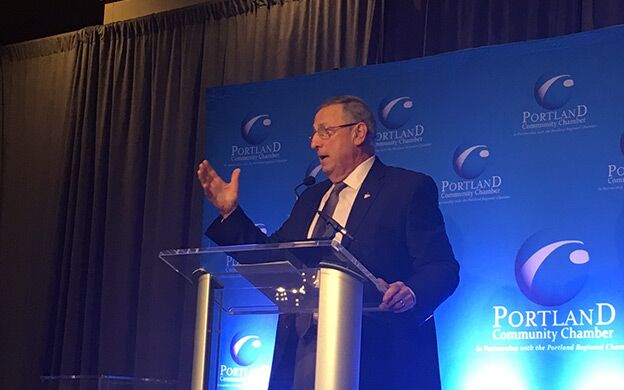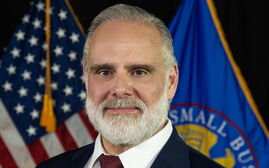LePage: Maine still an 'anti-business state'
 Courtesy / Portland Regional Chamber of Commerce
Gov. Paul LePage speaks to 400 people gathered for the Portland Community Chamber of Commerce's Eggs & Issues monthly business forum today in Portland.
Courtesy / Portland Regional Chamber of Commerce
Gov. Paul LePage speaks to 400 people gathered for the Portland Community Chamber of Commerce's Eggs & Issues monthly business forum today in Portland.
Painting a grim picture of Maine as hostile to business, Gov. Paul LePage on Friday called for fixing the education system — though not just through spending — growing the tax base, and looking to the state’s 17 million acres of forests as an energy source.
“We are still an anti-business state,” LePage told more than 400 people attending the Portland Regional Chamber of Commerce’s Eggs & Issues monthly business forum today, the last before the summer break.
Addressing education first, the governor lamented the fact that enrollment is declining — and test scores have remained flat for the past 20 years — despite continued increases in funding, much of which never gets to where it’s needed.
In Maine, he said, 59 cents out of every dollar spent on education gets to the classroom, below the national average of 64 cents on the dollar. “Think about that,” he said. LePage also referred to Maine’s “top-heavy” system, with 148 superintendents for 176,000 student compared to Florida with only 64 superintendents for 3 million students.
LePage added that while the national average for administering a school district is 2.4% of the budget, in Maine the figure is 5.5%. “We have some of the poorest, lowest-paid teachers in America because we don’t put enough money in the classroom,” he said.
He also that that fixing the education system will require more than just throwing money at it.
“We’ve got a lot of work to do, and it’s not about money, it’s about fixing the problems,” he said. “I urge you all to tell your legislators that it’s not just about money, it’s about quality … and making sure that the kids get the best chance in life that they have.”
Budget deadline approaching
LePage’s comments come as legislators face an end-of-month deadline to reach a compromise on a new state budget. Senate Republicans have offered to make $100 million in new funding available to schools if Democrats agree to repeal a controversial 3% surcharge on households earning $200,000 or more.
The surcharge, designed to raise money for education, took effect this year after voters approved it by a narrow margin last November. It comes on top of a 7.15% regular income tax rate, putting the top marginal rate at 10.15% — a new high for Maine and No. 2 after California.
Since November, LePage said he had heard “hundreds of people” saying they were leaving Maine because of the higher taxes, adding that he couldn’t blame them. “There’s no wonder that people that have a few dollars and retire, they move out of state. They protect their nest egg, and they ought to.”
He repeated his call for getting rid of income taxes in Maine altogether and growing the tax base in other ways, for example by making visitors pay a higher sales tax. Citing Florida as an example, he said, “No one complains when they go to Disney or Universal Studios that the sales tax is too high … We really need to think about that going forward.”
On energy, LePage said that Maine is New England’s highest industrial user of electricity and suggested looking to the state’s 17 million of forests as an energy source.
“We have to reinvent ourselves and we have to go back to using our forests,” he said. It’s a working forest and it’s got value.” Asked at the end to name some good things about Maine, the governor pointed to the the community college system as “one of the best deals in America,” and praised Maine Maritime Academy as “one of the best institutions in the world.”
Quincy Hentzel, interim CEO of the Portland Regional Chamber of Commerce, said after the event that the governor touched on an issue the chamber has also taken on, namely the need to grow.
“We need to grow our tax base,” she told Mainebiz in an email, “and one of the ways we can do that is by supporting policies that allow Maine to become more business friendly, making our tax structure competitive and offering incentives, such as the student loan repayment program the governor discussed, to attract a new generation of workers in the state.”














Comments